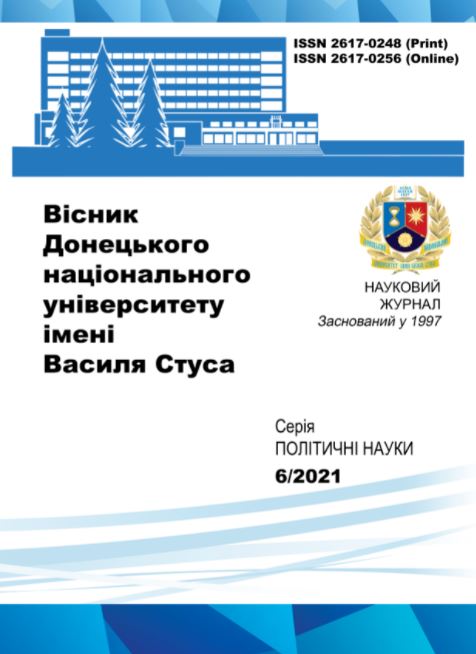D. Bell about the innovative nature of post-industrial society
DOI:
https://doi.org/10.31558/2617-0248.2021.6.2Keywords:
post-industrial society; information technology; science; knowledge; merritocracy; democracy are compliantAbstract
The essence of D.Bell’s understanding of post-industrial society is analyzed. It turned out that the scientist understood it as an "analytical construction", and not a characteristic of a particular society, focusing on the main factor of this society, which determines its radical differences from the industrial society, namely, the large-scale growth of "intellectual technology".
It is noted that the scientist distinguishes eleven important features of a new society, five of which are closely related to science and knowledge. The rest – with the dissemination of information, the development of information technologies and their impact on the political sphere of society. Interesting are the thinker’s opinions on political power in the future society, in particular about the "merivocracy", the transition from representative democracy to "democracy of participation", the place and role of a democratically minded politician in the political processes of the information age.
Now the focus is on threats associated with the use of sophisticated information technology and general control over information that can be poured out by abuse, from hiding information to illegal or false disclosure. Therefore, institutional restrictions in the field of information are needed.
It is summed up that industrial society is consideredD.Bell mainly through the prism of its main advantages: the innovative nature of production, the growing role of knowledge as a strategic resource of development and knowledge carriers as a leading stratum of society, its transformation into a "collective good", subordination of economic social and cultural.
References
Bell D. Hriadushchee postyndustryalnoe obshchestvo: Opыt sotsyalnoho prohnozyrovanyia; per. s anhl. / pod red. V. L. Ynozemtseva. Yzd. 2-oe, yspr. y dop. Moskva: Academia, 2004. 788 s.
Neisbyt D. Mehatrendы; per. s anhl. M. B. Levyna. Moskva: OOO «Yzd-vo AST»: ZAO NPP «Ermak», 2003. 380 s.
Ynozemtsev V. L. Postyndustryalnыi myr D. Bella // Bell D. Hriadushchee postyndustryalnoe obshchestvo: Opыt sotsyalnoho prohnozyrovanyia / pod red. V. L. Ynozemtseva; per. s anhl. Yzd. 2-oe, yspr. y dop. Moskva: Academia, 2004. S. 9-84.
Alekseeva Y. Yu. Voznyknovenye ydeolohyy ynformatsyonnoho obshchestva. Ynformatsyonnoe obshchestvo. 1999. № 1. S. 30-35.
Marukhovskyi O.O. Politychni aspekty zarubizhnykh kontseptsii informatsiinoho suspilstva: dys… kand. polit. nauk : Instytut politychnykh i etnonatsionalnykh doslidzhen im. I. F. Kurasa. Kyiv, 2008. 239 s.
Kartunov O. V., Marukhovskyi O.O. Informatsiine suspilstvo: analiz politychnykh aspektiv zarubizhnykh kontseptsii. Kyiv: Un-t ekonomiky ta prava «Krok», 2012. 344 s.
Bell D. Sotsyalnыe ramky ynformatsyonnoho obshchestva; per. s anhl. // Novaia tekhnokratycheskaia volna na Zapade / sost. y vstup. statia P. S. Hurevycha. Moskva: Prohress, 1986. S. 330-342.
Young M. The Rise of the Meritocracy 1870-2033: An Essay on Education and Equality. Harmondsworth, Middlesex: Penguin Books, 1961. 218 r.
Vysotska O.Ie. Komunikatyvna polityka derzhavy v itsstoryko-filosofskomu vymiri. Politolohichnyi visnyk. 2020. Vyp. 85. S. 210-225.
Karpchuk N.P. Stratehichna komunikatsiia YeS yak zasib u borotbi z dezinformatsiieiu. Politychne zhyttia. 2019. № 1. S. 52-58.

